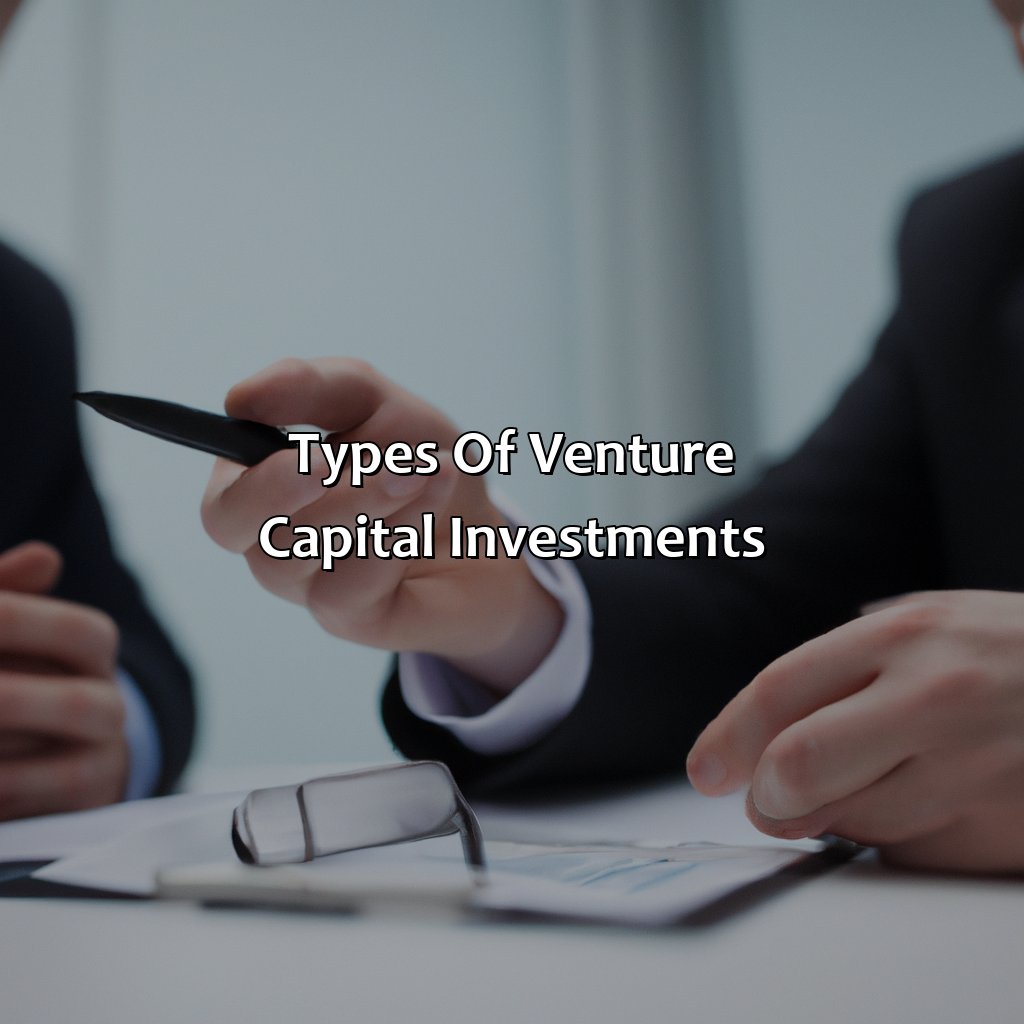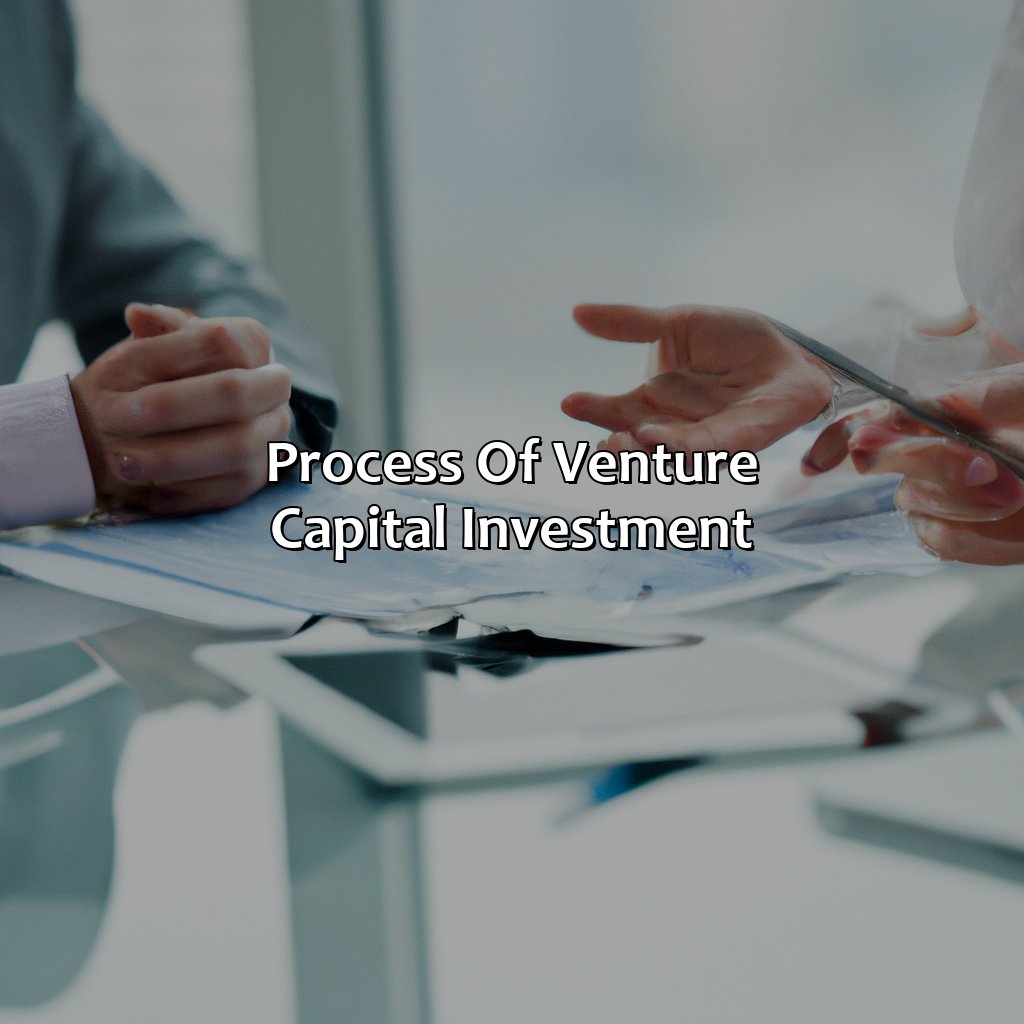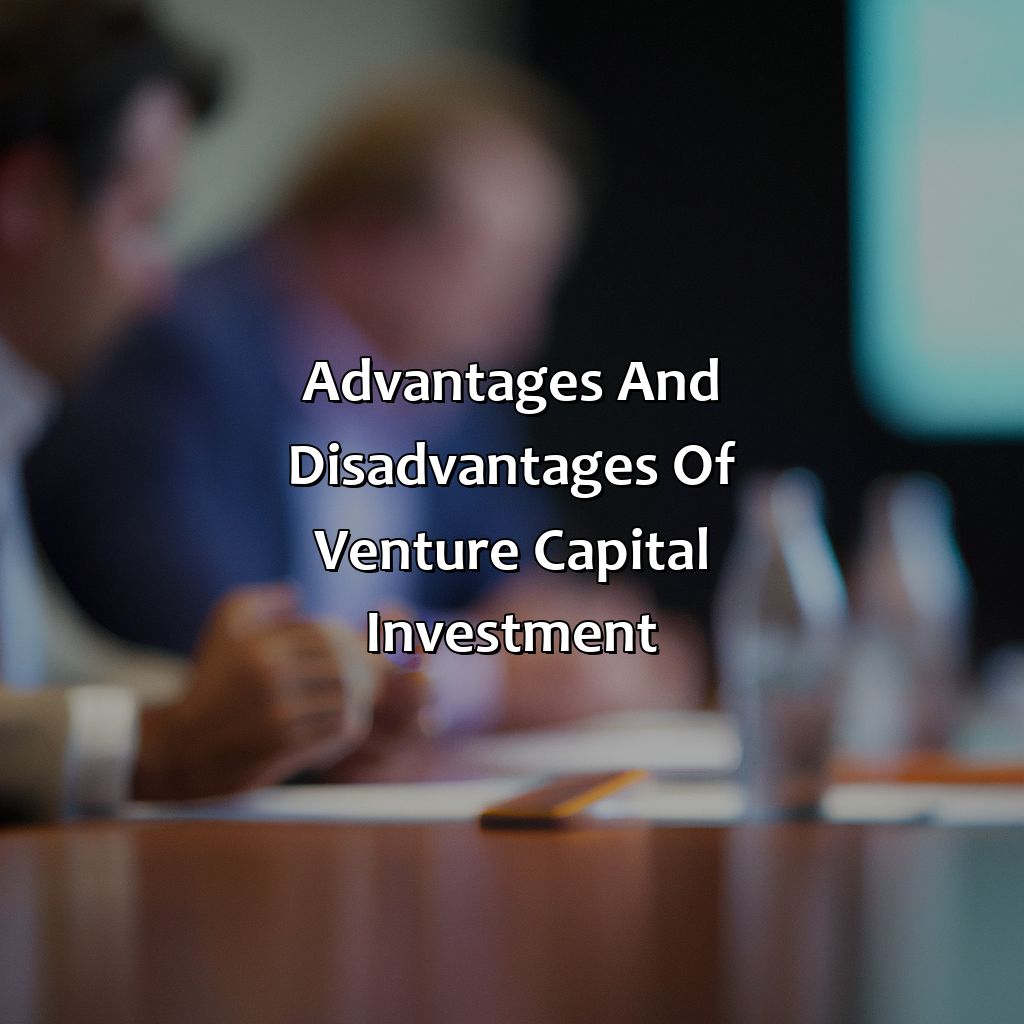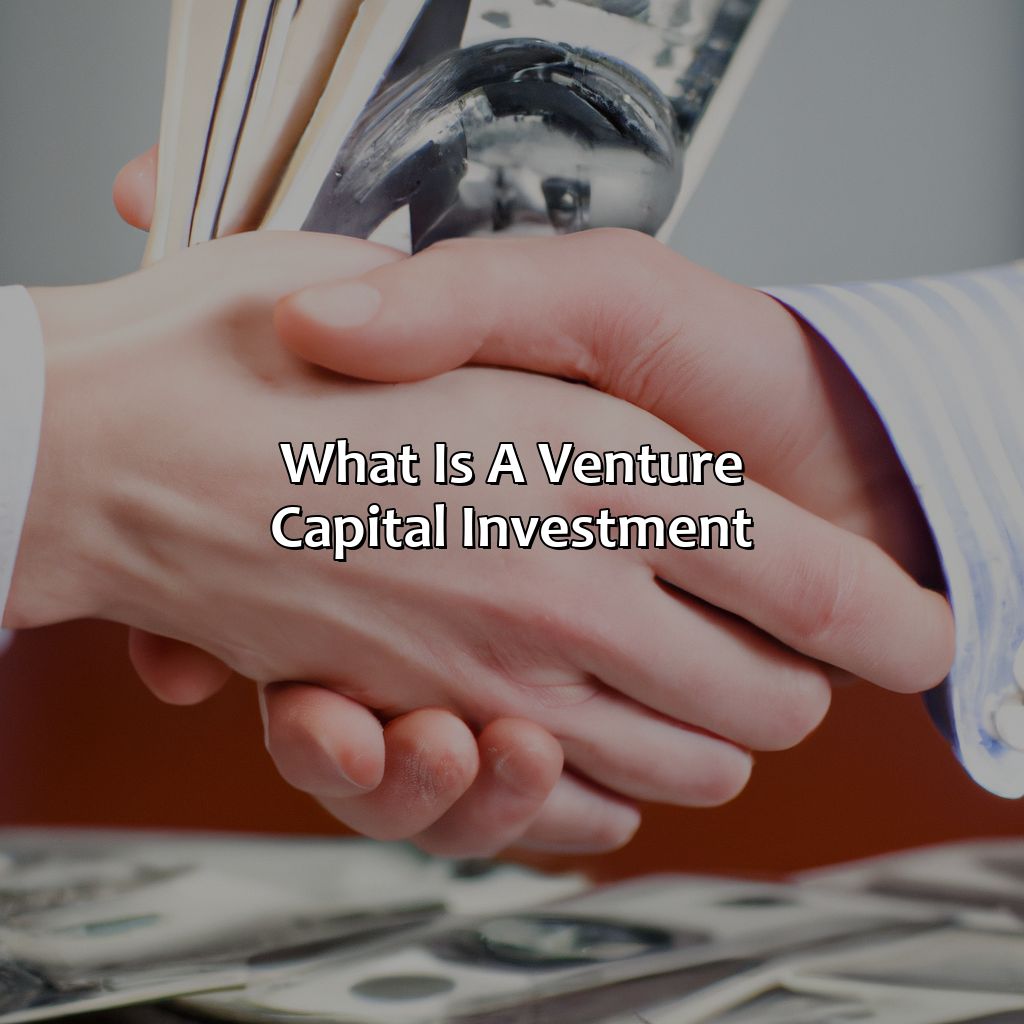What Is A Venture Capital Investment?
Key Takeaway:
- A venture capital investment is a type of funding for startups or early-stage companies that have innovative ideas and high growth potential. The investors provide funds and support, in exchange for shares in the company and a potential return on their investment.
- There are three types of venture capital investments: early stage, expansion, and acquisition or buyout. Early stage investments are typically made in startups with promising ideas and little to no revenue, while expansion investments are made in more established companies looking to grow. Acquisition or buyout investments are made in mature companies with a proven track record.
- The process of venture capital investment involves identifying investment opportunities, screening and evaluating potential investments, negotiating and structuring the investment deal, and providing ongoing monitoring and support to the company.
Have you ever thought about taking the plunge and investing in a startup but are uncertain about the venture capital investment?You are in the right place. In this article, we discuss the concept and mechanisms of venture capital investments, helping you make informed decisions.
Definition of Venture Capital Investment
Venture Capital Investment refers to financing provided to promising startups with high growth potential in exchange for shares and a seat on the board of directors. This type of investment aims to generate substantial returns in the long-term by funding innovative companies that can disrupt markets. Venture capitalists assess a startup’s potential for success through rigorous due diligence before investing. Startups seek venture capital to scale up operations, build their brand and acquire customers.
Venture capital firms typically invest in startups in their early stages and can provide additional rounds of funding as the company grows. These firms specialize in specific industries and select startups that align with their investment thesis. Startups that receive venture capital funding can also benefit from the guidance and expertise of the investors who sit on their board of directors.
In addition to funding, venture capitalists also bring their network, industry knowledge, and experience to help startups navigate challenges and grow their business. They often have deep connections in their respective industries and can introduce startups to potential customers, partners, and investors.
Therefore, seeking venture capital investment is an attractive option for startups that require significant funding to scale quickly and access expertise in their industry.
If you’re a startup with high-growth potential, seeking venture capital investment can give you access to resources and networks that can boost your growth trajectory. Don’t miss out on the opportunity to scale your business and reach its full potential by ignoring venture capital as a source of funding.

Image credits: retiregenz.com by David Jones
Types of Venture Capital Investments
Want to know about the different types of venture capital investments? Then, plunge into the details of early-stage, expansion, and acquisition or buyout stages. This’ll give you a better understanding of the way venture capitalists prop up various stages of development in emerging companies.

Image credits: retiregenz.com by Yuval Woodhock
Early Stage
For early stage venture capital investments, investors provide funding to startups in their initial stages of development. These startups typically have a great idea but lack funding and need investment to help them grow. Early stage investments have the highest potential of return for investors, but they also carry the highest risk. Startups can use the funds to hire staff, develop a prototype or invest in marketing.
As startups develop, they may require additional funding. This is where the growth stage comes in. Growth stage venture capitalists invest money into companies that are already past their early stages and showing signs of growth and success. At this point, these companies are able to demonstrate a clear path towards profitability.
In addition to providing funding, venture capitalists also offer strategic guidance and expertise. They serve as mentors and coaches, helping startups navigate key decisions regarding operational strategy, sales channels and other critical elements of business management.
To maximize returns on investment, it’s important for investors to carefully evaluate potential opportunities before committing funds. Conducting thorough due diligence on each potential investment target can help mitigate risks associated with early-stage investing. Additionally, selecting investments that align with an investor’s particular interests or experience can further improve their chances of success in the venture capital space.
Expanding your business is like jumping out of an airplane with a parachute made of venture capital – sometimes it works out, sometimes you crash and burn.
Expansion
In the realm of venture capital, supporting businesses through the expansion stage is a crucial investment strategy. This involves providing funding to startups looking to scale or establish themselves in new markets beyond their existing one. Expansion implies taking very calculated risks and requires careful management decisions to ensure positive growth outcomes.
Expansion investments often involve companies with more developed products or services that have started to generate revenue and are looking for outside investment to accelerate their growth trajectory. During this phase, venture capitalists tend to take a less hands-on approach, monitoring progress less frequently while remaining readily available for guidance when needed.
It is vital for investors to conduct proper due diligence before investing in these types of companies as there are inherent risks involved, including competition from other established players, regulatory or legal roadblocks, and market shifts. Still, if executed well, an expansion strategy can result in significant returns on investment and help sustain long-term value creation for all parties involved.
Pro Tip: Venture capitalists should prioritize trust-building efforts with portfolio companies during the expansion phase by offering mentorship opportunities and fostering open lines of communication that can help drive success later on.
Buying a company with someone else’s money? Sounds like a relationship where you’re the rebound, not the prize.
Acquisition or Buyout
A venture capital investment type that involves acquiring or buying out an established company is a form of strategic investment. The investors acquire ownership stakes and management control, and they might decide to merge the company with another or resell it. This form of investment can provide significant returns, though it comes with high risk due to the large upfront capital required.
Acquisition or buyout investments are options for established companies seeking long-term goals, such as vertical integration or diversification. This kind of strategic investment determines the investors’ level of influence in decision-making processes and allows them to leverage their expertise to increase the target company’s value. By negotiating more favorable terms with suppliers and/or customers, implementing cost controls, or identifying underperforming business units.
Venture capitalists should conduct thorough market research before considering acquisition or buyout investments in a particular industry and have a well-structured exit strategy in case things don’t work out as planned. Investors must assess financials such as revenue growth trajectory, profitability outlook, cash flow management policies, capital budgeting practices during due diligence, ensuring that the potential acquisition aligns with their strategy and risk tolerance.
To maximize opportunity rewards while minimizing risks in the acquisition process entails understanding cultural differences between the investing parties. The VC should develop a long-term relationship with management teams by providing informative support at every stage of the business cycle through providing value-added services such as human resources advice, supply chain optimization insights.
Investors must also monitor markets closely to identify trends early on and capitalize on attractive opportunities before they become mainstream.
Venture capitalists love a good gamble, which is why they’re willing to invest in startups that have a better chance of seeing a UFO than profitability.
Process of Venture Capital Investment
Identifying investment opportunities is key to venture capital investment! To succeed, one must screen and evaluate these options, then negotiate and structure investments. Monitoring and support are essential too – all these parts work together for a successful venture capital investment.

Image credits: retiregenz.com by Harry Arnold
Identification of Investment Opportunities
Through thorough analysis, potential investment opportunities are identified in the venture capital process. A diverse set of factors such as market trends, innovation potential, and scalability are taken into consideration when evaluating investment opportunities. Acquisition of relevant data through research and networking help in identifying these investment opportunities to ensure that ventures possess the necessary growth indicators for successful investments.
When identifying investment opportunities, a comprehensive view is taken to evaluate the potential of the venture. Factors such as team skill set, business model and competition within respective markets are considered apart from just financial indicators. The aim is to identify ventures which possess the potential to not only return profit but also create substantial social and economic value while ensuring sustainability.
Data concerning underlying trends in various industries needs constant monitoring when investigating possible investor introductions. Investors frequently use target research approaches that enable generation expansion since it helps them recognize tendencies and anticipate changes more efficiently within their selected industry.
It is estimated that on average 0.05% of companies each year receive Venture Capital funding globally (PitchBook).
Finding the perfect startup to invest in is like looking for a needle in a haystack, except the needle is a unicorn and the haystack is a forest full of mediocre ideas.
Screening and Evaluation
When looking for potential investments, venture capitalists use a rigorous process of analysis referred to as the vetting phase. This stage involves screening and evaluation of potential target companies based on set criteria specific to the venture firm. The vetting process can include reviewing business plans, financial statements, market research, and management teams.
Venture capitalists typically look for high-growth potential, innovative products or services, competitive advantages, clear exit strategies, and scalable business models that can generate significant returns upon exit.
During screening and evaluations, a set of guidelines is followed to ensure that only high-potential start-ups are selected for investment. These guidelines include assessing business viability and growth potential such as revenue projections and forecasting tactical gains which can lead to company expansion. On top of this guideline is the assessment of management caliber and expertise recognizing how they have demonstrated past campaigns in bringing similar ventures to fruition. After all these processes are satisfied is when the decision-making team decides whether an investment will be made.
VCs notably have been seen pushing technology forward with successful businesses like Tesla or SpaceX leading furthermore it its advancement as futuristic ventures sprout overnight. Having said all these there exist many fears from ordinary people who stay cautious about giving up equity or approaching funders – this phobia comes from realizing that great businesses have been frustrated by bad funding cycles especially during 2008-2010 after which bad press turned investors away making it hard for them to re-approach targets without raising eyebrows
You know it’s serious business when negotiating the investment feels more like a hostage situation than a boardroom meeting.
Negotiation and Structuring of Investment
Investment Structuring and Negotiation is a crucial fragment of the capital infusion process. This involves the discussion, arrangement, and approval of high-level terms. Structuring outlines several deal elements, including investment amount, valuation, seniority rights, voting power, conversion provisions and liquidation preferences.
A Venture Capitalist can provide substantial negotiation leverage in situations wherein entrepreneurs are raising their first rounds of funding. At times, there could be disputes with respect to Valuation or other terms that could result in protracted conversations between stakeholders. It’s the role of a good VC to work with these entities to level the playing field. The VCs firmly believe that execution trumps everything else so they focus on building harmony amongst all parties.
Interestingly enough, History has found many such negotiations taking underhanded turns despite cooperative on-paper agreements between the involved parties. Several such scenarios have sparked lengthy legal battles wherein neither side appears willing to negotiate any further. Modern companies are much more averse to entering into such scenarios due to potential harm towards their reputation but it still makes for an intriguing piece of historical work.
Venture capitalist: A Godfather who not only helps you with money but also keeps an eye on how you use it.
Monitoring and Support
As the investment progresses, Venture Capitalists (VCs) engage in continuous supervision and guidance, providing Monitoring and Support to the invested start-up. This process allows VCs to ensure that their investment is on track and make critical decisions when necessary.
During this phase, VCs offer advisory services in areas such as financial management, human resources, corporate strategy and marketing. They also provide networking opportunities with industry giants and connect start-ups with potential partners.
In addition to standard reporting requirements, such as financial statements, VCs frequently request access to unique metrics crucial for assessing market penetration or customer retention. By doing so, they can monitor the progress of the business more accurately.
While engaging in this process of Monitoring and Support, VCs may face complex issues such as underperformance or ineffective leadership. To tackle these challenges effectively, it is important for them to work closely with founders to review options for recovery or restructuring while ensuring long-term viability of the startup.
To optimize Monitoring and Support strategy; VC’s could improve transparency by providing regular feedback alerts on progress made by invested startups. Receiving feedback enhances the transparency level of decision-making processes within the company leading to improved trust between all parties involved in steering strategic decisions which has been highly successful across investment portfolios.
Venture capital investment: where you get financial backing and a constant reminder that you’re not the smartest person in the room.
Advantages and Disadvantages of Venture Capital Investment
In discussing the benefits and drawbacks of investing in venture capital, it’s important to consider both the upside potential and the inherent risks.
- Advantages:
- Potential for high returns on investment
- Access to expert business guidance and mentorship
- Involvement in innovative and exciting new ventures
- Diversification of investment portfolio
- Opportunity to participate in the growth and success of a company
- Disadvantages:
- High level of risk involved in early-stage ventures
- Longer timeframe for returns on investment
- Lack of liquidity and potential for difficulty in exiting investments
- High fees and expenses associated with venture capital firms
- Potential for dilution of ownership and control in the company
It’s important to note that venture capital investment may not be suitable for all investors and requires a high tolerance for risk. However, for those interested in investing in cutting-edge technologies and innovative startups, it may be a worthwhile endeavor.
In making a decision about investing in venture capital, it’s important to thoroughly research the potential firms and opportunities and to consider working with a reputable and experienced venture capital firm. It’s also wise to diversify investments and to carefully consider the level of risk involved in each investment opportunity. With proper research and investment strategies, venture capital can offer exciting possibilities for growth and financial gain.

Image credits: retiregenz.com by Adam Woodhock
Five Facts About Venture Capital Investments:
- ✅ Venture capital investments are typically made in startups or early-stage companies with high growth potential. (Source: Investopedia)
- ✅ VC firms provide funding in exchange for equity in the company and often take an active role in the management and growth strategy. (Source: Forbes)
- ✅ The average VC investment is around $7 million, but some can be as small as $100,000 and others as large as $100 million. (Source: PitchBook)
- ✅ VC firms look for companies with innovative products or services, a talented management team, and a large addressable market. (Source: Harvard Business Review)
- ✅ VC investments are considered high-risk, high-reward and are typically made by wealthy individuals or institutional investors. (Source: Entrepreneur)
FAQs about What Is A Venture Capital Investment?
What is a venture capital investment?
A venture capital investment is a type of funding provided to startups and early-stage companies by investors, typically in exchange for equity in the company. Venture capitalists are investors who provide financial backing to promising startups that have the potential to achieve high growth and returns.
How does venture capital investment work?
Venture capital investment typically involves a group of investors pooling their resources into a fund, which is then used to provide financial backing to startups. These funds are managed by professional investment managers who identify promising startups, conduct due diligence and negotiate terms with the founders. Once a deal is struck, the venture capitalists provide the funding and work closely with the startup to help them grow and succeed.
What are the benefits of venture capital investment?
One of the main benefits of venture capital investment is that it provides startups with access to much-needed funding and expertise. Venture capitalists typically have extensive experience in the industry and can provide startups with valuable insights and connections. Additionally, venture capital investment can help startups achieve rapid growth and reach their full potential.
What are the risks of venture capital investment?
Despite the potential benefits, venture capital investment can be risky for investors. Many startups fail to achieve the desired level of success, resulting in significant losses for investors. Additionally, venture capital investment typically involves long-term commitments and illiquidity, which can limit an investor’s ability to sell their stake in a company and exit the investment.
What types of startups are suitable for venture capital investment?
Venture capital investment is typically suitable for startups and early-stage companies that have the potential for high growth and returns. These startups should be in markets that can support significant growth, have a disruptive product or service, and are led by a capable and experienced management team.
How do I attract venture capital investment to my startup?
To attract venture capital investment to your startup, it’s essential to have a compelling business plan, a clear vision for growth, and a product or service that addresses a significant market need. Additionally, it’s essential to demonstrate that you have a capable and experienced management team and a plan to achieve profitability and generate returns for investors. Building a strong network and seeking guidance from experienced advisors can also help attract venture capital investment.
